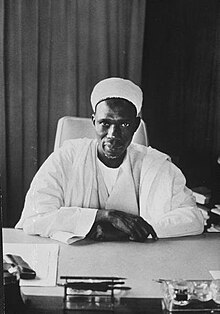Prime Minister of Nigeria
This article needs additional citations for verification. (June 2022) |
| Prime Minister of Nigeria | |
|---|---|
| Alhaji sir Abubakar Tafawa Balewa | |
 | |
| Federal government | |
| Type | Head of government |
| Member of | Cabinet |
| Appointer | Governor-General of Nigeria (1960–1963) President of Nigeria (1963–1966) |
| Formation | 1 October 1960 |
| First holder | Abubakar Tafawa Balewa |
| Final holder | Abubakar Tafawa Balewa |
| Abolished | 15 January 1966 |
The prime minister of Nigeria was a political office in Nigeria. The Prime minister was the head of government in the country from 1960 to 1966, when the office was replaced by the president of Nigeria holding this role.
History of the office
[edit]When Nigeria gained independence from the United Kingdom on 1 October 1960, it originally had a parliamentary constitutional monarchy with Queen Elizabeth II as the head of state.
But in 1963, Nigeria ended its status as a Commonwealth Realm and became a republic.[1] The head of state was the president, while the prime minister served as the head of government. In 1966, the office of prime minister was abolished (as the inaugural holder of the office, Abubakar Tafawa Balewa, had been assassinated) and since then, Nigeria has been a presidential republic with the president as the head of state and head of government.
Prime Minister of Nigeria (1960–1966)
[edit]| No. | Picture | Name
(Birth–Death) |
Term of office | Political Party | Cabinet | Ref. | ||
|---|---|---|---|---|---|---|---|---|
| Took office | Left office | Time in office | ||||||
| Prime Minister of the Federation of Nigeria | ||||||||
| 1 |  |
Abubakar Tafawa Balewa (1912–1966) |
1 October 1960 | 1 October 1963 | 3 years | Northern People's Congress | Balewa II | |
| Prime Minister of the Federal Republic of Nigeriathis is the bello and the lashes uncle | ||||||||
| (1) |  |
Abubakar Tafawa Balewa (1912–1966) |
1 October 1963 | 15 January 1966 (Assassinated) |
2 years, 106 days | Northern People's Congress | Balewa II–III | |
| Post abolished (15 January 1966 – Present) | ||||||||
See also
[edit]References
[edit]- ^ Ugorji, Basil (2012). From Cultural Justice to Inter-Ethnic Mediation: A Reflection on the Possibility of Ethno-Religious Mediation in Africa. Denver, Colorado: Outskirts Press. p. 79. ISBN 978-1-4327-8835-3. OCLC 794821499.

